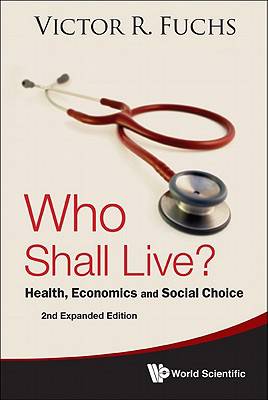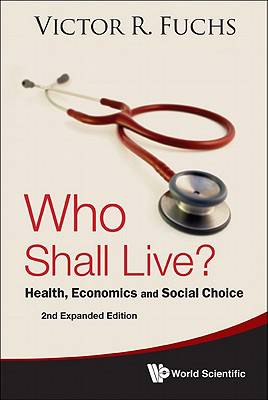
- Afhalen na 1 uur in een winkel met voorraad
- Gratis thuislevering in België vanaf € 30
- Ruim aanbod met 7 miljoen producten
- Afhalen na 1 uur in een winkel met voorraad
- Gratis thuislevering in België vanaf € 30
- Ruim aanbod met 7 miljoen producten
Zoeken
Who Shall Live? Health, Economics and Social Choice (2nd Expanded Edition)
Victor R Fuchs
Paperback | Engels
€ 60,45
+ 120 punten
Omschrijving
Since the first edition of Who Shall Live? (1974) over 100,000 students, teachers, physicians, and general readers from more than a dozen fields have found this book to be a reader-friendly, authoritative introduction to economic concepts applied to health and medical care. Fuchs provides clear explanations and memorable examples of the importance of the non-medical determinants of health, the dominant role of physicians in health care expenditures, the necessity of choices about health at the individual and societal levels, and many other compelling themes.Now, in a new introduction of some 8,000 words including new tables and figures, Fuchs, often called the "Dean of health economists", concisely summarizes the major changes of the past 37 years in health, medical care, and health policy. He focuses primarily on the United States but includes remarks about health policy in other countries, and addresses the question of whether national health care systems are becoming more alike. In addition to reviewing changes, the introduction explains why health expenditures grow so rapidly, why health spending in the United States is so much greater than in other countries, and what physicians need in order to practice cost-effective medicine.This second expanded edition also includes recent papers by Fuchs on the economics of aging, the socio-economic correlates of health, the future of health economics, and his policy recommendations for the United States to secure universal coverage, control of costs, and improvement in the quality of care. As was true of the first expanded edition (1998), this book will be welcomed by current students and life-long learners in economics, other social and behavioral sciences, medicine, public health, law, business, public policy, and other fields who want to understand the relation between health, economics, and social choice.
Specificaties
Betrokkenen
- Auteur(s):
- Uitgeverij:
Inhoud
- Aantal bladzijden:
- 388
- Taal:
- Engels
Eigenschappen
- Productcode (EAN):
- 9789814354882
- Verschijningsdatum:
- 5/07/2011
- Uitvoering:
- Paperback
- Formaat:
- Trade paperback (VS)
- Afmetingen:
- 168 mm x 209 mm
- Gewicht:
- 521 g

Alleen bij Standaard Boekhandel
+ 120 punten op je klantenkaart van Standaard Boekhandel
Beoordelingen
We publiceren alleen reviews die voldoen aan de voorwaarden voor reviews. Bekijk onze voorwaarden voor reviews.








